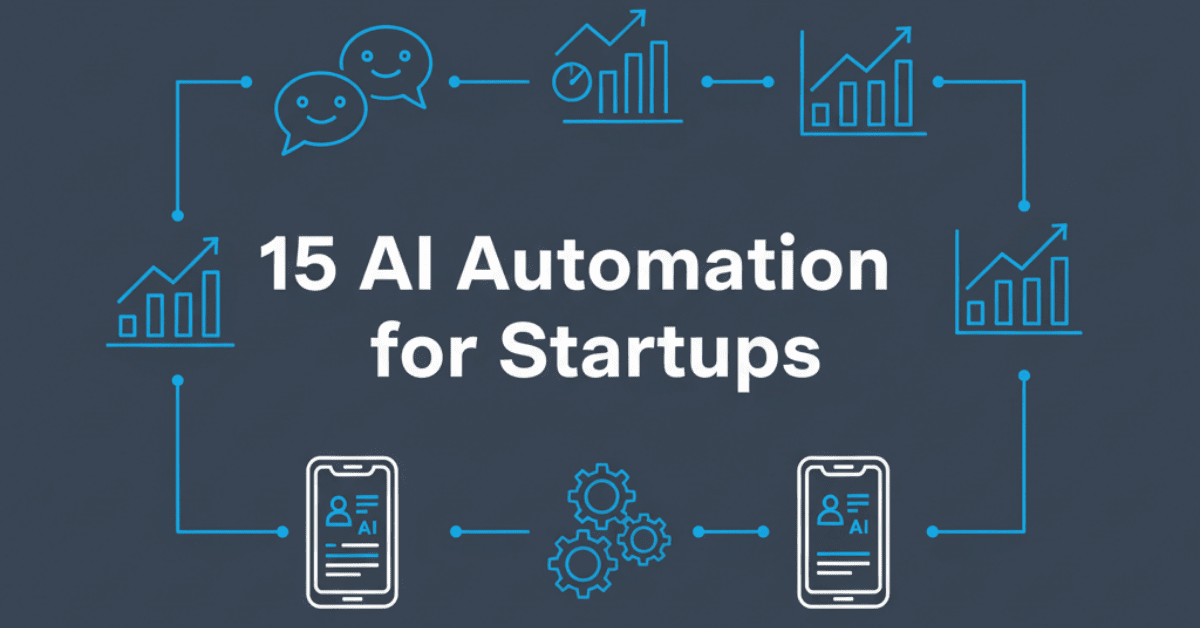Key Takeaways
- Customer service automation through AI chatbots reduces response times by 90% while handling 80% of common inquiries without human intervention
- Predictive analytics integration helps startups forecast demand, optimize inventory, and reduce operational costs by up to 25% in the first year
- Content generation automation using AI tools accelerates marketing workflows by 300%, enabling small teams to compete with larger organizations
- Sales process optimization with AI lead scoring and automated nurturing increases conversion rates by 40% while reducing manual sales tasks
- Financial management automation through AI-powered tools provides real-time insights and reduces accounting errors by 85%, crucial for growing startups
How can startups use AI? This question echoes through co-working spaces and founder meetups worldwide as entrepreneurs seek competitive advantages in an increasingly digital landscape. AI integration for startups isn’t just a luxury anymore—it’s becoming essential for survival and growth in 2025.

The startup ecosystem has transformed dramatically. Where once only tech giants could afford sophisticated AI solutions, today’s entrepreneurs have access to powerful, affordable AI tools that can revolutionize their operations. From automating mundane tasks to predicting market trends, AI integration for startups offers unprecedented opportunities to scale efficiently without massive teams or budgets.
The AI Revolution: Why Startups Can’t Afford to Wait
Picture this: Two identical startups launch simultaneously. One embraces AI integration for startups from day one, while the other sticks to traditional methods. Six months later, the AI-powered startup operates with half the staff costs, triple the customer satisfaction rates, and data-driven insights that guide every strategic decision. This isn’t science fiction—it’s happening right now.
The democratization of AI technology means that startup AI automation tools are more accessible than ever. Cloud-based AI services, no-code platforms, and subscription-based AI tools have leveled the playing field, allowing bootstrapped startups to compete with established enterprises.
15 Game-Changing Ways AI Integration for Startups Drives Success
Customer Experience & Support
1. Intelligent Chatbots for 24/7 Customer Service Modern AI chatbots handle complex customer inquiries, schedule appointments, and even process orders. Implementing startup AI automation in customer service typically reduces support costs by 60% while improving response times dramatically.
2. Personalized Customer Journey Mapping AI analyzes customer behavior patterns to create personalized experiences. This AI for small business application increases customer lifetime value by understanding individual preferences and predicting future needs.
3. Sentiment Analysis for Social Media Monitoring Automated sentiment analysis tracks brand mentions across platforms, alerting teams to potential issues before they escalate. This proactive approach to reputation management is crucial for growing startups.
Sales & Marketing Optimization
4. Predictive Lead Scoring AI algorithms evaluate lead quality based on historical data, helping sales teams focus on high-probability prospects. This startup AI automation technique often doubles conversion rates.
5. Dynamic Pricing Optimization AI-powered pricing engines adjust prices in real-time based on demand, competition, and market conditions. E-commerce startups using this technology typically see 15-25% revenue increases.
6. Content Generation and SEO Optimization AI tools create blog posts, social media content, and product descriptions while optimizing for search engines. This AI for small business solution dramatically reduces content creation time and costs.
7. Email Marketing Automation AI personalizes email campaigns based on user behavior, send-time optimization, and content preferences, often achieving 50% higher open rates than traditional campaigns.
Operations & Productivity
8. Automated Data Entry and Processing AI eliminates manual data entry errors and processes documents automatically. This startup AI automation saves countless hours while improving accuracy.
9. Inventory Management and Demand Forecasting Machine learning algorithms predict inventory needs, reducing both stockouts and overstock situations. ML for startups in retail typically reduces inventory costs by 20-30%.
10. Automated Financial Analysis and Reporting AI-powered accounting tools categorize expenses, generate financial reports, and identify cost-saving opportunities without human intervention.
11. Smart Scheduling and Resource Allocation AI optimizes staff scheduling, meeting coordination, and resource allocation based on workload patterns and availability.
Product Development & Innovation
12. User Behavior Analytics AI analyzes how users interact with products, identifying pain points and optimization opportunities. This data-driven approach accelerates product improvement cycles.
13. A/B Testing Automation Machine learning automates testing processes, determining winning variations faster and with greater statistical significance than manual testing.
14. Quality Assurance Automation AI-powered testing tools identify bugs, performance issues, and security vulnerabilities before products reach customers.
15. Market Research and Competitive Analysis AI monitors competitors, analyzes market trends, and identifies opportunities, providing startups with enterprise-level market intelligence.
Implementation Strategy: Your AI Integration for Startups Roadmap
Successfully implementing AI integration for startups requires strategic planning rather than random tool adoption. Here’s how to approach it:
Phase 1: Foundation Building (Months 1-2) Start with tools that address your biggest pain points. If customer service overwhelms your team, begin with chatbots. If manual data entry consumes hours, prioritize automation tools.
Phase 2: Process Optimization (Months 3-4) Expand to areas where startup AI automation can streamline workflows. Focus on repetitive tasks that drain team energy and creativity.
Phase 3: Strategic Enhancement (Months 5-6) Implement predictive analytics and advanced AI for small business applications that drive strategic decision-making.
Real-World Success Stories
Consider the startup that integrated AI-powered customer service and reduced support tickets by 70%, allowing their two-person team to focus on product development instead of answering repetitive questions. Or the e-commerce startup using ML for startups to optimize their inventory, reducing waste by $50,000 in their first year.
These aren’t isolated success stories—they represent the new reality where AI integration for startups creates competitive advantages that were unimaginable just a few years ago.
At Kinetik Dynamic, we’ve helped dozens of startups implement AI solutions that transform their operations. Our approach focuses on practical, ROI-driven implementations that deliver immediate value while building foundations for future growth.
Overcoming Common AI Integration Challenges
Budget Constraints Many AI tools offer freemium models or affordable monthly subscriptions. Start small and scale as ROI demonstrates value.
Technical Expertise No-code and low-code AI platforms make implementation accessible without technical teams. Many solutions require minimal technical knowledge.
Data Quality Concerns Begin with tools that work effectively with limited data sets. As your data quality improves, expand to more sophisticated AI applications.
Change Management Introduce AI gradually, demonstrating value to team members and addressing concerns proactively.
The Future is Now: AI Automation for Small Businesses
The question isn’t whether to implement AI integration for startups—it’s how quickly you can start. Every day without AI automation represents missed opportunities for efficiency, growth, and competitive advantage.
According to McKinsey’s research, businesses using AI report average revenue increases of 6-10% and cost reductions of 6-8%. For startups operating on tight margins, these improvements can mean the difference between thriving and merely surviving.
The startups that embrace AI integration today will dominate their markets tomorrow. Those that wait will find themselves struggling to catch up to competitors who automated their way to efficiency and scale.
Ready to Transform Your Startup with AI?
Don’t let your competitors gain an unfair advantage through AI integration for startups while you’re still doing everything manually. The time to act is now—every day of delay means lost opportunities for growth, efficiency, and competitive positioning.

Discover your AI automation potential:
- Get personalized recommendations for your specific startup challenges
- Learn which AI tools deliver the fastest ROI for your industry
- Understand how to implement startup AI automation without breaking your budget
- Receive a custom AI integration roadmap designed for your business goals
Book Your Free AI Strategy Consultation and discover how AI integration for startups can revolutionize your business operations. Our team has helped hundreds of startups implement AI solutions that drive real results—let us show you what’s possible for your venture.
Limited consultation spots available this month. Secure your competitive advantage now.
FAQ
Q: How can startups use AI without a large budget? A: Start with freemium AI tools like chatbots, automated email marketing, and basic analytics platforms. Many powerful AI solutions cost under $50/month and deliver immediate ROI that justifies expansion to more advanced tools.
Q: Do I need technical expertise to implement AI automation for small businesses? A: No! Modern AI tools are designed for non-technical users. Platforms like Zapier, HubSpot, and Intercom offer drag-and-drop AI automation that requires no coding knowledge. Most implementations can be completed in hours, not months.
Q: What’s the fastest way to see ROI from AI integration for startups? A: Begin with customer service chatbots or email marketing automation. These typically show results within 30 days—reduced support workload and increased conversion rates provide measurable ROI almost immediately.
Q: How do I choose which AI tools to implement first? A: Identify your biggest time drains or cost centers. If customer support overwhelms your team, start there. If manual data entry consumes hours daily, prioritize automation tools. Focus on pain points that directly impact revenue or team productivity.
Q: Can AI integration for startups really compete with larger companies? A: Absolutely! AI levels the playing field by automating tasks that previously required large teams. A startup with smart AI integration can often outperform larger competitors in customer response times, personalization, and operational efficiency.
